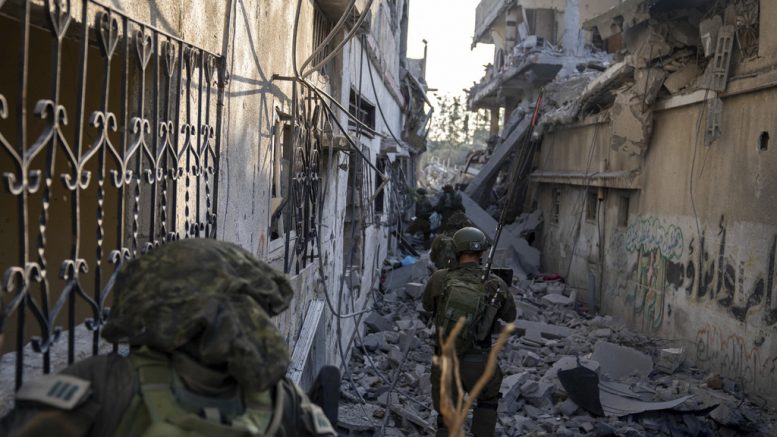RAFAH, Gaza Strip (AP) — Israel’s military hit the family home of the exiled leader of Hamas on the outskirts of Gaza City with an airstrike Saturday and pressed ahead with attacks across in the besieged enclave where a humanitarian crisis is rapidly worsening.
With food, water and the fuel needed for generators that power hospitals and other facilities running out, U.N. Secretary-General Antonio Guterres urged an immediate cease-fire to allow aid in.
“The humanitarian situation in Gaza is horrific,” Guterres said late Friday in an unusually blunt statement. “An entire population is traumatized, nowhere is safe.”
U.S. Secretary of State Antony Blinken has been in the region since Friday trying to find ways to ease the plight of the civilians caught in the fighting and was meeting with Arab foreign ministers on Saturday. His mission is complicated by Israel’s insistence there can be no temporary cease-fire until all hostages held by Hamas are released.
Guterres said he had not forgotten the slaughter of civilians at the hands of Hamas militants when they launched their attack on Israel almost a month ago, but said civilians and civilian infrastructure must be protected. He also said civilians must not be used as human shields, and called upon Hamas to release all of the roughly 240 hostages it has.
The family home of Hamas’ exiled leader Ismail Haniyeh, in the Shati refugee camp on the northern edge of Gaza City, was hit Saturday morning by an airstrike, according to the Hamas-run media office in Gaza. It had no immediate details on damage or casualties and there was no immediate comment.
Senior Hamas official Ghazi Hamad told The Associated Press that the house was being used by Haniyeh’s two sons.
The home is located in a narrow alley in the refugee camp, which has become a crowded neighborhood of Gaza City over the generations. Haniyeh, a former aide to Hamas’ founder, Ahmed Yassin, who was killed in an Israeli airstrike in 2004, has been in exile since 2019.
Overnight strikes also hit the western outskirts of the city and near Al-Quds Hospital.
Adly Abu Taha, a Gaza City resident who has sheltered in the hospital grounds for the past three weeks, said strikes have repeatedly hit close to the hospital in recent days.
“The bombardment gets closer day by day,” he said over the phone. “We don’t know where to go.”
Hundreds of thousands of Palestinians remain in the city and across northern Gaza.
Israel says Hamas has extensive military infrastructure in the city, including a network of underground tunnels, bunkers and command centers. It says its strikes target Hamas, and the militants endanger civilians by operating among them.
The city is now encircled by Israeli forces, who have been urging civilians to head south to avoid getting caught up in the fighting.
Despite those warnings, Israel has continued striking in the south, saying it is targeting Hamas members, but bombs are also killing entire families.
Raed Mattar, who was sheltering in a school in the southern town of Khan Younis after fleeing the north early in the war, said Saturday that he regularly heard explosions, apparently from airstrikes.
“People never sleep,” he said. “The sound of explosions never stops.”
About 1.5 million people in Gaza, or 70% of the population, have fled their homes, according to the U.N.
In the center of Khan Younis, an airstrike early Saturday destroyed the home of a family, with first responders pulling three bodies and six injured people from the rubble.
Among those killed was a child, according to an Associated Press cameraman at the scene.
The Israeli military said ground forces were also now operating in the south, with an armored and engineering corps working to remove booby traps from buildings.
During the operation the military said fighters were seen exiting a tunnel and they were killed by Israel troops.
The military said there were also numerous attacks staged from tunnels on Israeli forces in the northern Gaza strip.
Elsewhere, skirmishes along Israel’s northern border continued Saturday morning as the Israeli military said it had struck militant cells in Lebanon trying to fire at Israel, as well as a Hezbollah observation post.
Throughout the war, Israel and Hezbollah, an ally of Hamas, have traded fire almost daily along the Lebanese border, raising fears of a new front opening there.
In his first public speech since the war began, Hezbollah leader Hassan Nasrallah on Friday suggested escalation was possible, but gave little sign that Hezbollah would fully engage in the fighting. So far, Hezbollah has taken calculated steps to show backing for Hamas without igniting an all-out war that would be devastating for Lebanon and Israel.
DIPLOMACY
On Friday in Tel Aviv, on his third trip to Israel since the war began, Blinken pushed President Joe Biden’s calls for a brief halt in the fighting to address the worsening humanitarian crisis. But Israeli Prime Minister Benjamin Netanyahu said there could be no humanitarian pause until Hamas releases all the hostages it holds.
On Saturday he held meetings in Amman with diplomats from Jordan, Egypt, Saudi Arabia, Qatar, the United Arab Emirates and the Palestinian Authority, who remain angry and deeply suspicious of Israel.
In addition to aid distribution, allowing foreigners out and the release of hostages, Blinken is looking to get Jordan and other Arab states to begin to think about the future of Gaza if and when Israel succeeds in wresting control from Hamas.
Arab leaders have thus far resisted American suggestions that they play a larger role in crisis, expressing outrage at the civilian toll of the Israeli military operations but believing Gaza to be a problem largely of Israel’s own making.
CASUALTIES RISING
More than 9,200 Palestinians have been killed in Gaza so far, including more than 3,600 Palestinian children, the Gaza Health Ministry said, without providing a breakdown between civilians and fighters.
More than 1,400 people have died on the Israeli side, mainly civilians killed during Hamas’ initial attack. Rocket fire by Gaza militants into Israel persists, disrupting life for millions of people and forcing an estimated 250,000 to evacuate. Most rockets are intercepted.
Twenty-four Israeli soldiers have been killed in Gaza since the start of the ground operation.
The overall toll is likely to rise dramatically as the assault on densely built-up Gaza City continues.
More than 386 Palestinian dual nationals and wounded exited Gaza into Egypt on Friday, according to Wael Abou Omar, the Hamas spokesperson for the Rafah border crossing. That brings the total who have gotten out since Wednesday to 1,115.





































